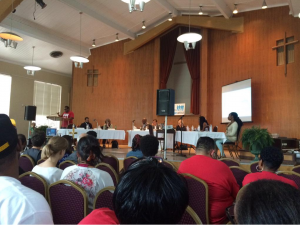A public gathering this week served as an important reminder that far too many workers in the District face inadequate hours and unpredictable work schedules that erect barriers to providing for their families and furthering their education.
The Workers’ Rights Board Hearing, convened by DC Jobs with Justice, featured testimony from workers, advocates, and researchers about how such practices harm workers, and, as a result, are bad for businesses, too.
 The powerful workers’ stories included:
The powerful workers’ stories included:
- Samantha Davis, from So Others Might Eat (SOME), spoke of Lawrence, a homeless man who worked in food service. He often is forced to walk the streets all night because scarce shelter beds usually are full by the time his shift ends at 9:30 p.m.
- RasImani Diggs, an employee at Marshall’s in Columbia Heights, said two of her co-workers were denied time off to attend family funerals, because management did not consider the deceased “immediate family.”
- Claudia Esteve, from the Carlos Rosario International School, noted that erratic work schedules make it impossible for many people to both work and attend school. Often they end up dropping out of school, damaging their long-run economic prospects.
These stories added a personal touch to the recent joint research on unfair scheduling conducted by DC Jobs with Justice, the DC Fiscal Policy Institute, and the Georgetown University Kalmanovitz Initiative. The report found that many service sector companies use “just-in-time” scheduling’where employee schedules are changed frequently in an attempt to match customer foot traffic, reservations, or sales volumes’and that this creates many problems for workers.
Those at the hearing noted that using more fair scheduling practices, such as giving workers schedules two weeks in advance, is helpful not only to employees but to employers as well. When employees receive schedules that are more predictable and manageable, their morale is higher, and they stay on the job longer. This results in higher productivity and reduced turnover costs, according to a new report by the Center for Law and Social Policy (CLASP). Several retail and food service employers in the District’such as El Camino Restaurant and Beadazzled’already practice these measures to improve employee retention and morale, CLASP reports.
Yet because many employers do not see the potential benefits of implementing such changes on their own, the District’s elected leaders should advance legislation to ensure that workers have access to fair, predictable schedules. These standards should include giving workers sufficient advance notice of their schedules, encouraging stable work schedules in place of just-in-time practices, and protecting part-time employees from being discriminated against with regard to pay, leave, and promotion opportunities.
The hearing also generated an idea for reforming DC’s paid sick leave requirements to help workers. Councilmember Elissa Silverman, who spoke at the event, was so moved by Ms. Diggs’ story that she suggested reforming DC’s law to allow workers to use sick leave for bereavement.
Such actions would go a long way to helping hard-working DC residents provide for their families and continue the education that they need to advance their careers.
The DC Council will likely take up fair scheduling legislation when it reconvenes in the fall. Stay tuned to the District’s Dime for updates.
Click here to print a copy of today’s blog.
